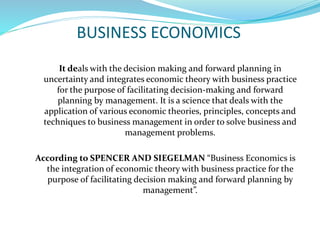Recognizing Economic Concepts for Better Service Decision-Making
In the complicated landscape of contemporary business, a detailed understanding of financial principles can substantially enhance decision-making procedures. The application of these economic theories frequently discloses unexpected obstacles and chances that can redefine strategic methods.
The Essentials of Economic Theory
Financial theory offers as the foundation for recognizing exactly how organizations and individuals make options in the presence of deficiency. At its core, economic concept examines the allotment of minimal sources to please unlimited wants. This essential concept of deficiency necessitates compromises, engaging decision-makers to assess the expenses and advantages connected with different options.
The two primary branches of economic concept are microeconomics and macroeconomics. Microeconomics concentrates on private representatives, such as firms and consumers, evaluating their behavior and communications in certain markets. It emphasizes principles like supply and need, cost elasticity, and market balance, which are vital for comprehending just how costs are determined and how sources are distributed.
On the other hand, macroeconomics takes a look at the economic situation all at once, resolving broader issues such as rising cost of living, unemployment, and economic growth. It gives understandings right into systemic phenomena that affect all economic agents, assisting policymakers in crafting efficient economic techniques.
Inevitably, a strong grounding in financial theory is necessary for reliable business decision-making. By recognizing the concepts of deficiency, compromises, and market characteristics, organizations can much better browse intricate environments and make educated options that enhance their competitive advantage.
Key Economic Indicators
Key economic signs function as crucial devices for analyzing the health and instructions of an economic situation, offering valuable understandings for service decision-making. These indications are quantitative steps that reflect the financial performance and can be categorized into leading, lagging, and coincident indicators.
Leading signs, such as consumer self-confidence indexes and stock market trends, predict future economic activity, enabling services to expect changes in the marketplace. Lagging indicators, like joblessness rates and business profits, provide insights right into the economic climate's past efficiency, helping services to assess long-lasting fads. Coincident signs, such as GDP growth and retail sales, fluctuate all at once with the economic situation, supplying a real-time picture of financial conditions.
Recognizing these signs allows services to make educated decisions pertaining to investments, resource appropriation, and tactical planning. By carefully monitoring these essential financial signs, businesses can browse unpredictabilities and position themselves efficiently in the ever-changing economic landscape, eventually enhancing their decision-making processes and long-term success.

Market Frameworks and Dynamics
Understanding market frameworks and dynamics is critical for organizations aiming to flourish in affordable settings. Market structures, generally classified right into best competition, monopolistic competitors, oligopoly, and monopoly, considerably affect prices techniques, item differentiation, and affordable habits. Each structure provides unique obstacles and opportunities that can dictate a company's critical direction.
In excellent competition, countless small firms compete, causing marginal pricing power and uniform products. On the other hand, in monopolistic competitors, companies separate their items, permitting some degree of pricing power while still dealing with competitors. Oligopolies, identified by a few leading gamers, bring about synergistic decision-making; companies should meticulously think about rivals' responses to their activities. Ultimately, syndicates exist when a solitary company regulates the marketplace, resulting in maximum prices power but commonly attracting regulatory examination.
Recognizing these characteristics allows businesses to prepare for market trends, adjust techniques, and enhance resource allotment. In addition, identifying just how outside variables like technology and law influence these structures can improve tactical planning. By grasping market frameworks and dynamics, firms can make informed decisions, ultimately enhancing their affordable setting and driving lasting development.
Consumer Habits Insights
Consumer behavior plays a critical role fit organization techniques and end results. Recognizing how customers make acquiring decisions, their choices, and the aspects influencing their actions can significantly improve a business's capacity to meet market needs. Trick insights right into customer behavior can be originated from assessing demographics, psychographics, and behavioral patterns.
Group elements such as age, education, gender, and income degree provide a fundamental understanding of target markets. Psychographics dive deeper, discovering consumers' attitudes, way of lives, and values, which can influence brand name loyalty and product understanding. Behavior understandings, such as purchasing regularity and response to promos, are important for tailoring advertising initiatives.
In addition, outside variables like financial conditions, social fads, and technical developments also influence click this customer choices. For example, throughout financial slumps, customers may focus on crucial products over deluxe items, changing demand patterns.
Applying Economics to Technique
Insights acquired from consumer habits contribute in formulating reliable business methods. By leveraging financial concepts, companies can much better recognize market dynamics, maximize resource allocation, and enhance affordable placing. Examining need flexibility, for example, makes it possible for companies to adjust rates strategies to maximize earnings while continuing to be appealing to consumers.
In addition, understanding market segmentation allows companies to tailor their offerings, ensuring they meet the certain demands and choices of diverse consumer teams. Business and Economics. This targeted strategy improves consumer satisfaction and cultivates brand commitment

Integrating video game theory right into calculated preparation also provides insights right into affordable habits, permitting companies to expect competing actions and develop counter-strategies efficiently.

Conclusion
In final thought, an extensive understanding of economic principles substantially enhances organization decision-making. By analyzing internet market frameworks, examining consumer behavior, my sources and assessing key economic indicators, companies can develop efficient strategies that straighten with market demands.
In the complicated landscape of modern company, a thorough understanding of financial principles can dramatically boost decision-making procedures.Leading indicators, such as consumer self-confidence indexes and stock market fads, predict future economic task, allowing businesses to anticipate adjustments in the market. By closely checking these key financial indications, businesses can browse unpredictabilities and position themselves properly in the ever-changing financial landscape, eventually improving their decision-making processes and long-term success.
By leveraging financial principles, organizations can much better comprehend market dynamics, enhance source allotment, and improve competitive positioning.In final thought, an extensive understanding of economic concepts considerably boosts service decision-making.